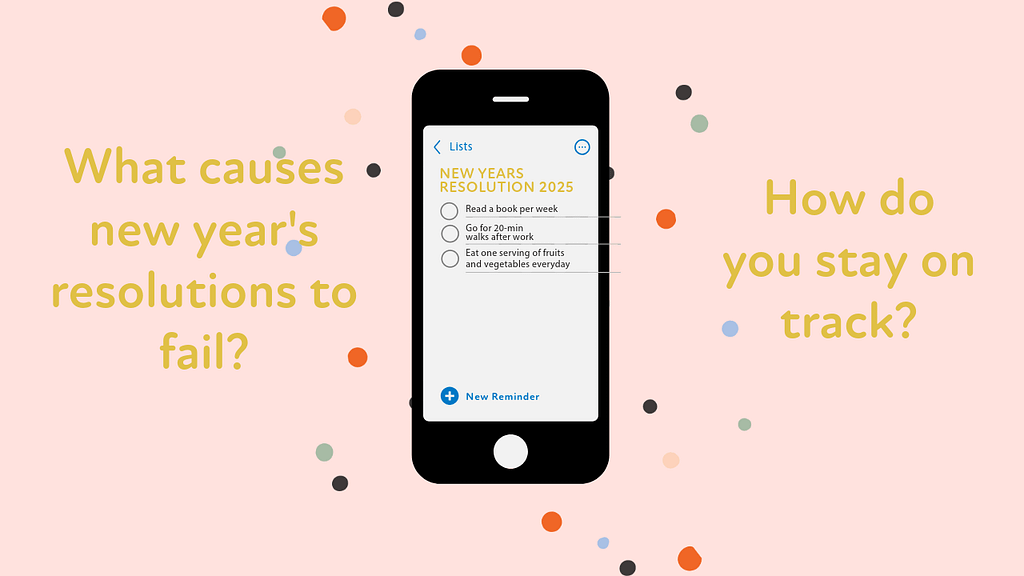According to Forbes, 80% of New Year’s resolutions have already failed by February—why do they fail? Why do so many struggle to follow through on our new year promises?
Whether you have already broken your resolutions or are losing motivation, you are far from alone. It is frustrating, but it is also completely normal. Here is the truth: most resolutions fail—not because of us, but because they are set up to fail.

But all hope is not lost. To revive your resolutions, you must understand why they fail and how to avoid the common pitfalls. Once you do that, you can implement strategies that help you stay consistent and on track.
In this article, I will walk you through the reasons behind these failures and ways you can bounce back.
Let’s dive right in.
Why new year’s resolutions often fail
Many factors contribute to why New Year’s resolutions fail. Some are external, such as unexpected life events or tragedies that shift our focus away from our goals. However, in most cases, the real reason lies internally within us. It comes down to our habits, mindset, and the decisions we make that determines whether our resolutions will succeed.

If you want to make your resolutions stick, it is crucial to understand the common reasons they fail and learn how to work around them. Here are some of the biggest pitfalls that keep people from achieving their New Year’s goals:
1. Weak purpose or lack of purpose
When trying something new, not having a clear “why” behind your goal can set you up for failure. At the start, excitement, and motivation drive you forward. But as time progresses, doubt sets in, causing you to question whether your effort is worth it. Without a strong purpose, you start losing momentum and eventually give up.
As a result, quitting becomes the easier option because your reason for starting isn’t strong or clear enough. It opens the door to allow uncertainty to enter, leaving you lost and unmotivated, ultimately leaving you to quit.
2. Too many distractions
When striving for a goal that is bigger than ourselves, we will certainly run into distractions. These distractions drain our time and energy that we could’ve invested towards our goals. The more we feed into these distractions, the more challenging it becomes to remove them.

From notifications on our phones and toxic people to social media, distractions come in many forms. Negative influences can make us doubt our goals, while constant app-switching kills focus and wastes valuable time. Therefore, the more we give in to these distractions, the more they threaten the success of our goals.
3. Fear of rejection or judgement
In a society where social interactions are essential for survival, it’s easy to become overly conscious of how we appear to others. We are all judgmental creatures, often criticizing the actions and behaviors of others before we criticize ourselves ourselves. Psychologically, this is known as the fundamental attribution error. Our tendency to critique others causes us to develop a fear of rejection and judgment
This fear often stems from constant comparisons with others, making us hyper-aware of ourselves and worried about not being accepted. Since we thrive on social connections, negative judgment or rejection can shake our confidence. As a result, we may hesitate to pursue our goals, choosing to play it safe rather than risk criticism or exclusion.
4. Desire for quick results
In a world of endless wants and needs, it is easy to focus on what we desire while overlooking the effort required to achieve it. From luxury cars and extravagant homes to healthier bodies, our desires can quickly pile up, often pushing our needs aside. As a result, we develop a tendency to chase quick results, forgetting that meaningful achievements require time and effort.

This desire for quick results causes us to choose instant gratification over delayed rewards. Instead of spending an hour at the gym working toward a bigger goal, we might opt for Netflix, choosing immediate comfort over long-term success. It makes us even more impatient, causing us to become inconsistent with our goals and ultimately leading us to give up altogether.
5. Lack of patience
As previously stated, the more impatient we become, the more inconsistent we become. Success does not happen overnight; it requires contributing a small amount of work each day until it ultimately compounds over time.
Patience is the determinant of whether we’ll succeed in our resolutions. We must be willing to wake up, put in the work, and embrace the boring process. Without patience, we risk becoming unmotivated, uninspired, and ultimately abandoning our goals.
6. Focusing too much on the end goal
New Year’s resolutions can quickly become overwhelming, especially when we view them on a grand scale. We focus on the end goal, like a healthier physique, imagining it as something so difficult to achieve. In doing so, we forget that progress happens one step at a time, one workout at a time.

Focusing too much on the end goal may cause us to be intimidated and overwhelmed, preventing us from taking any action at all. We become so paralyzed with fear that we give up on ourselves and our resolutions.
7. Focusing too much on the destination and less on the route
Your New Year’s resolutions—like achieving a healthier body or increasing your savings—are meaningful, but there is a problem. It is not how big your resolutions are but how arbitrary they are. When we set broad goals like “make more money” or “spend more time with family,” we often focus too much on the end result, neglecting the specific steps needed to get there.
This lack of clarity makes us more likely to give up, as these goals do not provide enough direction. As a result, it causes us to become overwhelmed, less motivated, and more likely to give up.
What to do if you failed your new year’s resolutions
In the pursuit of any goal, roadblocks are inevitable. Some days, everything will feel effortless, while other days, even getting out of bed might feel like you have to lift a boulder off your chest.
When you face failure, use it as a learning opportunity and keep pushing forward. Failing doesn’t mean you should give up on your resolutions.
Here’s what to do if you fail your New Year’s resolutions:
1. Give yourself grace
Whenever we fail, we often fall into a cycle of self-doubt and harsh self-criticism. We start blaming ourselves for the setback, which can significantly lower our self-esteem and confidence.

It’s essential, however, to give yourself grace and patience. Achieving any goal is a process of learning and growth, and you should always be proud of yourself for giving it your best effort, even if things do not go as planned. You can begin giving yourself grace by reflecting on what you did well and did not do well.
2. Understand what caused you to fail
Instead of viewing failure as a setback, see it as a valuable learning opportunity. By understanding the cause of your failure, you can prevent yourself from repeating the same mistake.
Self-reflection is key to understanding why you didn’t meet your New Year’s resolutions. Here are some questions to guide your reflection:
- What led to my failure? Was it emotional, environmental, or something else?
- What can I do to avoid repeating this mistake?
- Are there things I need to let go of?
- How will my progress be affected if I continue making the same mistake?What lessons can I learn from this experience?
Answering these questions can help you gain insight and make adjustments moving forward.
3. Change up your environment
Often, the cause of our failure can be our environment, and we may not even realize it. Certain items or people in our surroundings can unknowingly hinder our progress. For example, if your goal is to lose weight but cookies and chips are always in clear sight when you enter the kitchen, focusing on your resolutions becomes harder.

To improve your chances of success, consider changing your environment. This may involve removing distractions, like unhealthy foods or even friends who are unsupportive of your goals. The more you curate your surroundings to align with your objectives, the greater your focus and ability to achieve your goals.
4. Track your progress
Accomplishing goals requires significant time and effort, so tracking your progress is essential. It helps you stay engaged and motivated, reminding you that the hard work you’re putting in is paying off.
Here are some effective ways to track your progress based on your specific goals:
- Getting in better shape: Take progress pictures regularly and compare your before-and-after photos.
- Making more money: Create a budget, track your income and expenses, and set small, achievable financial goals.
- Improving mental health: Journal every day and reflect on how your thoughts and emotions evolve.
- Getting better grades: Keep records of your assignments and grades, then compare your performance over time.
Tracking your progress in these ways can keep you focused on your goals and motivate you to push through any challenges.
5. Set SMART goals
Goals like “lose weight” or “become healthier” are often too vague and do not provide a clear path to success. To make your goals more specific, achievable, and less overwhelming, you can use the SMART goal framework.

For example, instead of saying “lose weight,” a SMART goal would be: “Lose 5 pounds each month by exercising 30-60 minutes daily and eating less than 1,800 calories.” This goal is more focused, measurable, and actionable. You could even refine it further, but the key difference is that it is no longer vague—it has clear steps and a realistic timeline.
To convert your resolutions into SMART goals, understand the meaning behind each acronym and focus on what is realistic and what you can commit to for your unique situation.
6. Seek accountability
A lack of accountability is why many new year’s resolutions fail, as it removes the sense of responsibility, leading to a decrease in effort and poor decision-making.
Taking accountability is essential for success in achieving your resolutions. To do this, accept responsibility when you make mistakes and apologize to yourself when you fall short. Self-compassion is key. You can also enlist the help of others by asking them to check in on your progress regularly, ensuring you’re staying on track and holding yourself accountable.

By embracing accountability, you create a sense of responsibility that keeps you motivated and committed to your goals.
Conclusion
Setting New Year’s resolutions is similar to setting any goal for yourself—it requires time, patience, and discipline. To succeed in your goals, it is essential we recognize why new year’s resolutions often fail. Common reasons include a lack of purpose, impatience, and fear of judgment.
However, we can combat these challenges by implementing strategies that increase our chances of success. Setting SMART goals helps make our resolutions more specific and achievable while seeking accountability ensures we stay responsible and committed to our progress.

